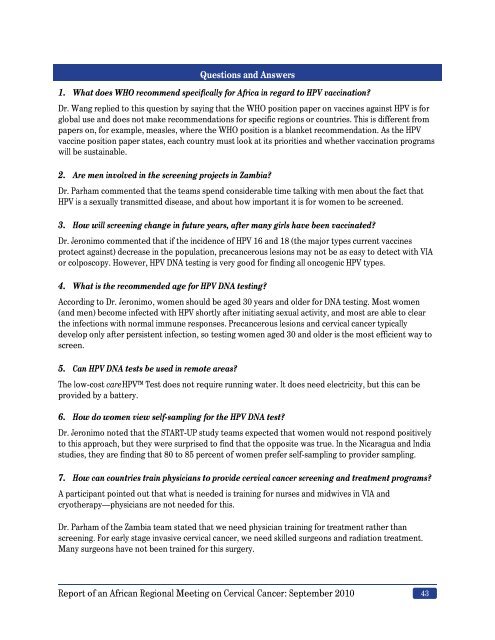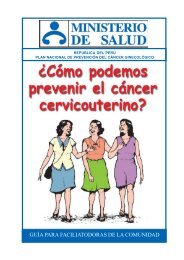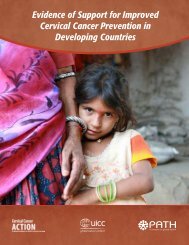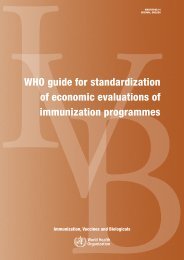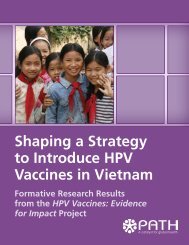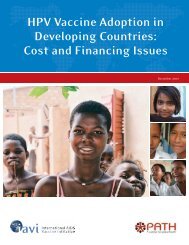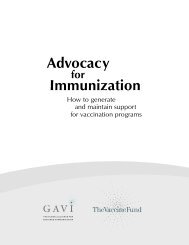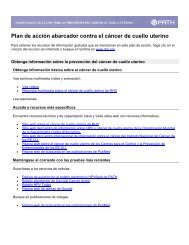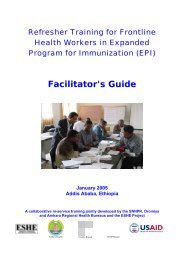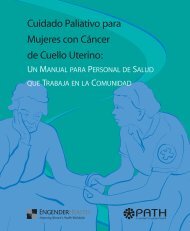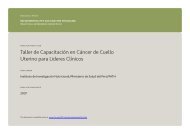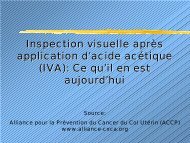Download file, English (1 MB PDF) - RHO
Download file, English (1 MB PDF) - RHO
Download file, English (1 MB PDF) - RHO
Create successful ePaper yourself
Turn your PDF publications into a flip-book with our unique Google optimized e-Paper software.
Questions and Answers<br />
1. What does WHO recommend specifically for Africa in regard to HPV vaccination?<br />
Dr. Wang replied to this question by saying that the WHO position paper on vaccines against HPV is for<br />
global use and does not make recommendations for specific regions or countries. This is different from<br />
papers on, for example, measles, where the WHO position is a blanket recommendation. As the HPV<br />
vaccine position paper states, each country must look at its priorities and whether vaccination programs<br />
will be sustainable.<br />
2. Are men involved in the screening projects in Zambia?<br />
Dr. Parham commented that the teams spend considerable time talking with men about the fact that<br />
HPV is a sexually transmitted disease, and about how important it is for women to be screened.<br />
3. How will screening change in future years, after many girls have been vaccinated?<br />
Dr. Jeronimo commented that if the incidence of HPV 16 and 18 (the major types current vaccines<br />
protect against) decrease in the population, precancerous lesions may not be as easy to detect with VIA<br />
or colposcopy. However, HPV DNA testing is very good for finding all oncogenic HPV types.<br />
4. What is the recommended age for HPV DNA testing?<br />
According to Dr. Jeronimo, women should be aged 30 years and older for DNA testing. Most women<br />
(and men) become infected with HPV shortly after initiating sexual activity, and most are able to clear<br />
the infections with normal immune responses. Precancerous lesions and cervical cancer typically<br />
develop only after persistent infection, so testing women aged 30 and older is the most efficient way to<br />
screen.<br />
5. Can HPV DNA tests be used in remote areas?<br />
The low-cost careHPV Test does not require running water. It does need electricity, but this can be<br />
provided by a battery.<br />
6. How do women view self-sampling for the HPV DNA test?<br />
Dr. Jeronimo noted that the START-UP study teams expected that women would not respond positively<br />
to this approach, but they were surprised to find that the opposite was true. In the Nicaragua and India<br />
studies, they are finding that 80 to 85 percent of women prefer self-sampling to provider sampling.<br />
7. How can countries train physicians to provide cervical cancer screening and treatment programs?<br />
A participant pointed out that what is needed is training for nurses and midwives in VIA and<br />
cryotherapy—physicians are not needed for this.<br />
Dr. Parham of the Zambia team stated that we need physician training for treatment rather than<br />
screening. For early stage invasive cervical cancer, we need skilled surgeons and radiation treatment.<br />
Many surgeons have not been trained for this surgery.<br />
Report of an African Regional Meeting on Cervical Cancer: September 2010 43


